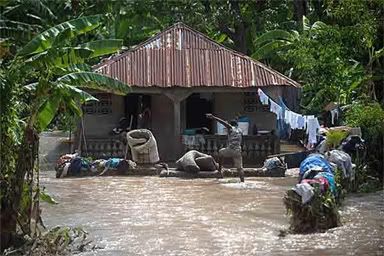Cross posted from the Worldwatch Institute’s Nourishing the Planet.
Care International’s work in Zambia has two main goals: increase the production of staple crops and improve farmers’ access to agricultural inputs, such as seeds and fertilizers. But instead of giving away bags of seed and fertilizers to farmers, Care is “creating input access through a business approach,” not a subsidy approach, according to Steve Power, Assistant Country Director for Zambia.
But instead of giving away bags of seed and fertilizers to farmers, Care is “creating input access through a business approach,” not a subsidy approach, according to Steve Power, Assistant Country Director for Zambia.
One way they’re doing this is by creating a network of agro-dealers who can sell inputs to their neighbors as well as educate them about how to use hybrid seeds, fertilizers, and other inputs. At the same time, “we are mindful” of the benefits of local varieties of seeds, says Harry Ngoma, Agriculture Advisor for the Consortium for Food Security, Agriculture and Nutrition, AIDS, Resiliency and Markets (C-FAARM). Care and C-FAARM are working with farmers to combine high- and low-technology practices.
Care thinks that this “business approach” will help farmers get the right inputs at the right time, unlike subsidy approaches that give farmers fertilizer for free, but often at the wrong time of year, making the nutrients unavailable to crops. And Care’s focus on training agro-dealers and giving them start-up grants allows the organization to remain invisible to farmers. Power says that Care wants to be a “catalyst to the market” and help transfer resources, without distorting the basic pricing structure.
Another component of Care’s work is improving the production of sorghum and cassava. “Zambia is as addicted to maize as we are to Starbucks coffee,” says Power. But by encouraging the growth of other crops, including sorghum, which is indigenous to Africa, Care can help farms diversify local diets as well as build resilience to price fluctuations and drought.
Care is promoting conservation farming in Zambia as well. The organization has been working in six districts since 2007, reaching 24,000 households. In addition to promoting minimum tillage practices and the use of manure and compost, Care is helping to train government extension officers about conservation farming so that eventually they’ll be responsible-instead of Care-for training farmers.
According to Power, the key to Care’s work is promoting business-like approaches to agriculture alongside more traditional ones, so farmers don’t become dependent on the organization for gifts of fertilizer or seed. These sorts of programs, according to Care, will be more effective at feeding people and increasing incomes than traditional food-aid projects that rely on long-term donor support. This is a big challenge in a country-and a region-facing the impacts of both climate change and the global economic crisis.
Stay tuned for more blogs about how farmers are linking to the private sector.
To learn more about Care’s work in Zambia, visit www.care.org/zambia.


 I will admit, explored options in dumping my party affiliation, in light of the GOP’s shenanigans as of late–
I will admit, explored options in dumping my party affiliation, in light of the GOP’s shenanigans as of late– As we
As we 
 We also visited a project helping to conserve another of Botswana’s precious resources–wildlife.
We also visited a project helping to conserve another of Botswana’s precious resources–wildlife. 